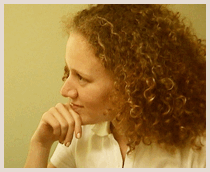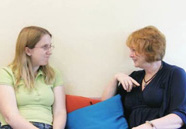At Listening Planet we teach a deeper, more open kind of listening than we tend to practice regularly in our western culture.
It is not used all the time, but when we believe the speaker needs special attention. (Of course, this could be all the time!) We use it when another person needs us to really listen to them, when they are angry, or have a dilemma, decision, confusion, idea, or plan to sort out, or when we are getting to know someone.
In listening deeply we provide a sounding board so the other can hear him or herself, a mirror so they can see inside themselves and perhaps straighten out their thoughts, and a bowl to hold their story so they can be relieved of carrying it for a spell.
Open listening can be called "social meditation" because the listener has to adopt the same inner processes as if meditating: you become quiet and centered inside, empty of your own story, and present to the separate yet shared reality of another person. This type of listening is as calming and focusing for the listener as for the one listened to.
We also limit our unconscious listening patterns which often block deep communication. We come to understand what our habits reveal about our own fears in a conversation, and the effect these habits have on the one speaking, inhibiting their ability to share openly.
Deep listening is a way of being in the world, not a technique we strap on top of old thinking. When we become deep, open listeners, we also develop a deeper appreciation for the world and a more open mind towards others. We are also calmer and more centered, able to handle stressful situations more evenly.
The characteristics of really listening are:
Being in the present moment, not worried about the past or future
Allowing silence in the conversation so the speaker can access his own thoughts
Refraining from giving advice or other unconscious habits which block the speaker
Asking questions and making reflections which help return the speaker to the wisdom which lies within each of us
We ask inward questions like:
• What's the truth for this person?
• What do I need to understand differently?
• What does he need to see in what he's saying?
• How can I help her help herself?
Here is a video of me listening.
Other pages on listening:
Underlying principles/beliefs for
being a deep listener
How listening benefits the listener
Listening as "social meditation"
Characteristics of ineffective listening
What characterizes ineffective listening?
We tend to listen unconsciously, unaware of how our responses are affecting the other person's speaking and thinking. We tend to put our own "stuff" to the forefront in our conversations, whether the stuff is our opinions, our ideas, or our needs. We often do not know how to respond when another person has a deep need, groping to help by giving advice, making platitudes, judging, fixing, and so on, when all the other person needs is to be really heard.
We do all sorts of things in the name of listening: make assumptions, filter out what we don't want to hear, analyze, insert our own story through comparing and advising, fix the other's problems, or minimize the importance of what the other says, interrupt, finish sentences… and this is just a beginning!
(Are you beginning to recognize somebody? Could it be you?)
• Does this thing being said threaten me?
• Do I get what I want?
• Is this good for the other person?
• Is this possible?
• How can I fix this for them?
• How is this like my experience?

There are really very few problems that can’t be solved by really listening. |
Do you have to practice good listening skills all the time? Can't you just be natural?
It is important to be yourself. After a while, you can color your good listening skills with your own personality, creating your own brand of good listening. And you don't always have to LISTEN; you will still want to joke around, kibbitz, tell your stories and wax philosophical and wise as you always have. There are certain times, though, when it is helpful to have some new tools of listening under your belt.
Special times when you should really listen are when someone wants to share with you:
• An idea
• A problem
• A decision to make
• A delight
• A difference with you

Marcia McReynolds calls deep listening “social meditation.”
What are some underlying principles in the act of really listening?
Every person on the planet wants to be heard.
We do all sorts of positive things to be heard but, when not heard, we often resort to destructive or ineffectual behaviors.
We each have inside us the innate wisdom and goodness to solve our own problems, make our decisions.
When we really listen to someone, we are returning someone to his own wisdom so they can help themselves.
We listen best, and stay calmer, when we can step back and see others as separate from us and our needs.
Anger is a lack of understanding. Being listened to can help dissipate anger so we can move on to understanding.
True love is allowing and encouraging another person to lead his or her own life, following their own inner guide, rather than overly advising, judging, or demanding. This is healthy detachment.
Deep Listening is an art
Really listening lets us off the hook; we find we don't have to fix, control, manipulate, react. Instead, through Really Listening, we can help someone else find their own wisdom in leading their own life.
Really listening requires that you stay hinged in the quivering little place between reacting and not caring. Really listening implies wholeness and stillness, perhaps even tenderness, even in the face of anger. I call this the "aspen leaf" place.
When someone really listens to us, we get to see ourselves. We see ourselves in their empathetic eyes, in their neutrally reflecting back what we have said, in the silence they allow us to think, in the witness they bear to our truth, even if it isn't theirs.
Listening in special situations like anger, lying, and manipulation
Caveat: Listening is not counseling, but it is very therapeutic.
Listening when you are angry is very hard to do. The mind cannot be in it's "higher" place to listen when angry. This takes lots of practice. It is best to cool off with time and/or exercise before listening.
Listening when someone else is angry. Make sure you are calm and diffused first, usually through time, movement or breathe. Then just listen silently until you are sure you can reflect back without getting mad. When in doubt of what to do, reflect back or be silent with a compassionate heart (something here about becoming present)
Listening When you think someone is lying or manipulating you: simply, you do not have to listen everyone. You get to decide what is good for you. Even the most practiced listeners get caught in the sticky web of a manipulative person's web. Just avoid them
Listening should not be used to manipulate people. Many people use listening skills to get someone to trust them when they are not trustworthy or to tell them things they can use to manipulate them. We are not teaching listening for this purpose. |
|
Basically, when you listen
deeply and openly you:
Put yourself aside while the other is speaking and become present to their separate reality
Believe that others are responsible
for their own lives, and that they
inherently have the wisdom to make choices for themselves
Hear the importance of another's truth even if you don't agree with it
Hear what they are needing under
their words, needs you may have, too
Let them know what you have heard
them say
Check for understanding, yours and
theirs. When we really listen, we seek understanding
Ask helpful questions that help return
them to their own thinking process,
to the heart of the matter, to seeing
things for themselves?
What does this type of listening
look like?

Here is a video
of me listening to one of my former students with a boyfriend issue. |


